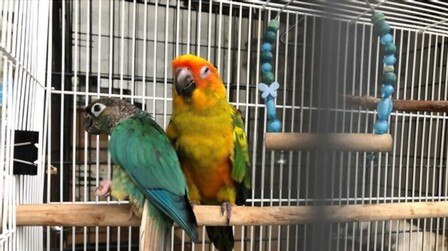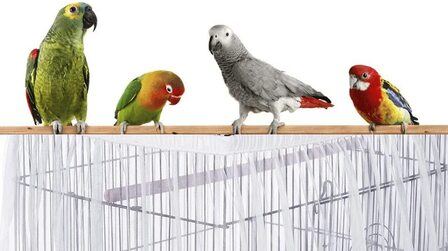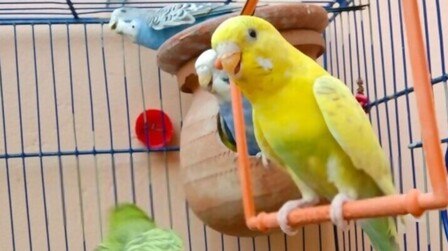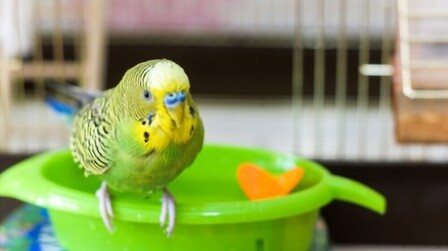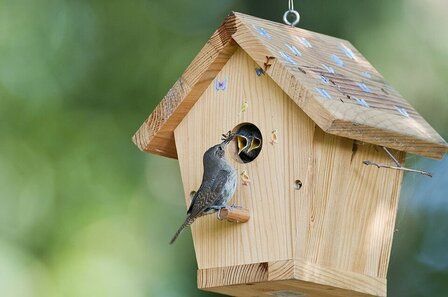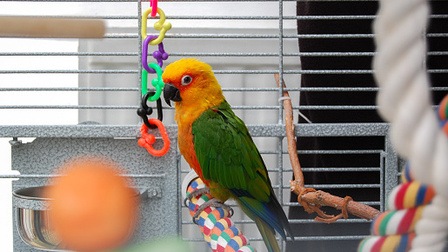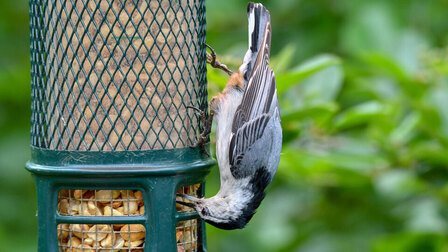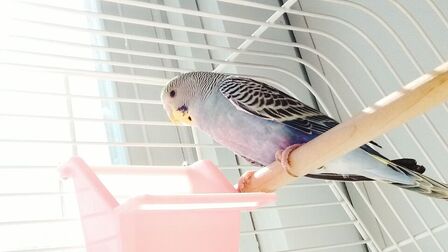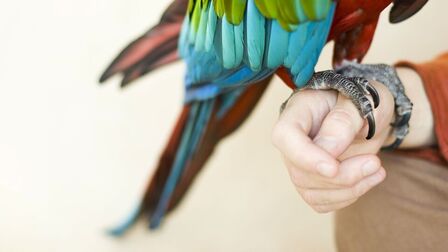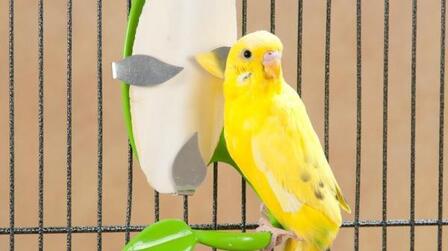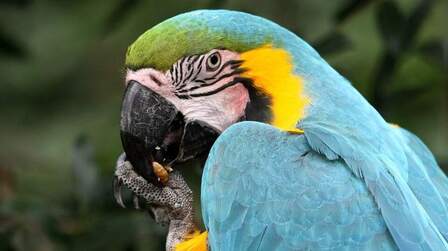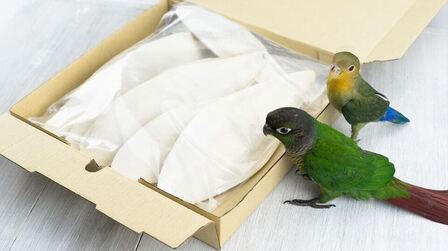It is impossible to spend a lot of time watching birds, it is difficult to describe the feeling when you see those birds in the backyard. Once the birds are in the feeder, they will enjoy the food while preening or perching around the structure. This action gives you a lot of satisfaction.
And how to keep the bird seed from falling on the ground?
When left unattended, bird seeds that fall on the ground can sprout and grow into unwanted weeds, which can attract pests like rats and mice and make the ground look dirty and messy. This article will provide how to do that easily.
1. Install Bird Seed Catcher
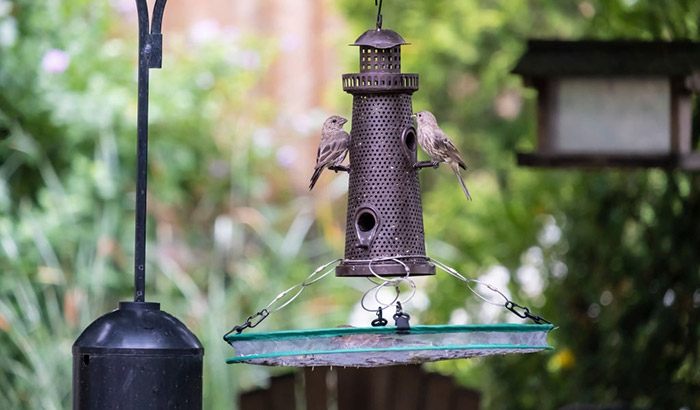
The way to prevent bird seeds from falling to the ground is to install a seed catcher under the feeder. This tool comes in many forms, but the sole purpose is to catch all the bird seeds that fall from the feeder.
There are some bird watchers who use a tray that will be placed underneath the feeder and will catch every drop of seed during bird visits.
You can find them on the commercial markets, but you can also make your own seed catchers. The equipment to prepare are hoppers large enough to fit under the feeder and must catch the seed as it falls to the ground. The key is to prevent mess by catching all the seeds and preventing them from falling to the ground.
2. Stable bird feeder

The main cause of seeds falling to the ground from bird feeders is its instability. Because when a bird starts feeding in a hanging feeder, it can create movements that cause the feeder to sway, which causes seeds to fall to the ground. The instability of the feeder and the constant movement of birds can spill food. However, this is prevented if you have a stable feeder.
In addition, bird feeders are fixed to a pole or perch. This type of feeder will be better than those that rotate on the line. Some swinging feeders can spill seeds when the bird is moving and active. Another reason for the feeder to sway is if the wind is too strong, it causes the feeder to move and sway, causing the seeds to fall on the ground.
3. Bird seed control

The most practical way to prevent seeds from falling to the ground is to limit the number of seeds in the bird feeder. As you continuously fill the feeder with seeds, small movements that can shake the feeder will spill seeds onto the feeder. Since the granules are full, it is easy for the seeds to fall out due to movement, especially when the feeder is swaying non-stop.
At the same time, you only need a small amount of food in your tray each day and don't need to be full.
Besides, you can feed your bird all the seeds available while you have a chance to replenish everything with fresh and new seeds after the seeds in the feeder have been consumed. Instead of stacking the feeder on top, pouring a small amount daily will mean less food falling to the ground.
4. Use a mixture of quality oats

The many ways seeds fall to the ground are when the bird doesn't like it and ends up throwing it on the ground. There are countless different types of seeds you can feed your birds, but not all of them are good. When they start to eat, they throw some seeds because they don't like them, that is, they will cause the seeds to fall on the ground.
So you use a good quality poultry seed mix to feed the birds. For cheap mixes containing different types of seeds, the birds will decline. Usually this bird seed is oats and red millet. In fact, there's a study that says birds visiting in the backyard will throw or throw unwanted seeds to the ground as they continue to forage.
5. Build an aviary

When seeds fall to the ground, they will sprout and grow, or squirrels trample things as they eat food that falls on the ground. The solution to preventing raccoons from eating seeds for backyard birds is to only give out as much seed as they can eat. Installing a backyard feeder is a fun way to attract birds to your garden.
As I mentioned above, birds are quite picky about the type of seeds they eat. Birds in particular don't like cheap bags of mixed seeds. Add a 3-4 inch layer of mulch underneath the feeder, flipping the mulch to bury debris where the decomposable seeds are out of sight. Change the mulch seasonally to remove any remaining debris.
6. Stick bird catcher together

Leaving bird seeds on the ground is not an option. The main goal is to clean up and dispose of the fallen bird seed so that it does not become moldy and endanger the health of the birds.
Some inexpensive mixes contain different types of seeds, so the birds will decline. Some of these bird seeds are red millet and oats.
The birds are smart enough to choose the food they like. Winter weather can blow bird seed pods across the yard, pop up feeders, and create a filthy mess of mold unless you clean up immediately. You can prevent some seeds from falling to the ground if you install a seed catcher.
When you leave the food empty for a day or two to encourage ground-feeding birds to pick up the scattered seeds and become the cleanup crew. These seeds and grains attract very few species, and birds will throw the seed on the ground instead of eating it, creating a tangled weedy mess. Birders can save money by choosing seeds that their birds like and providing only good food so there's no waste. The main cause is its unstable feeder. On the other hand, some birds start feeding in a hanging feeder, which can cause movements that cause the feeder to wobble, possibly causing seeds to fall to the ground.
7. Seed Catcher

Secure them to a branch or support with a piece of twine. Not only will you notice less seed scattering, but you will also experience a stable experience.
Before starting the actual construction process, it is important to take the necessary precautions to increase safety in the workplace. Working on a surface that is clean, free of debris and other forms of imperfections in the area is a must.
Next use all safety equipment such as eyeglasses and ear protection while cutting wood. Peanuts and mealworms are alternatives that won't harm your garden. Although it is expensive, it will take time to get used to it.
8. Consider for planting a wildflower garden

While ground-feeding birds will be able to easily pick up fallen seeds from the stems of wildflowers. Since then, many birds have also been attracted to wildflower seeds in the fall and winter. All wildflowers are hardy and will grow on their own.
9. Consider to plant low-growing shrubs

There are still some shrubs that can be heavily damaged by wildlife.
There are several ways to avoid these situations from happening.
Attach a piece of wire to the feeder pole and measure out about three to four feet.
Mark the perimeter with a faucet.
Plant boxwood or holly shrubs.
Conclusion
How to keep bird seeds from the ground is essential knowledge as a bird breeder. Birds will throw away unwanted seeds as they feed in the feeder, meaning these seeds can fall to the ground when the bird throws them out of the feeder. The constant movement of birds and strong winds can spill seeds on the feeder, causing it to fall to the ground.
A seed catcher is a method where you can place a device under the feeder to catch the seeds that fall.
Also, avoid hanging the feeder while the feeder is mounted on the stabilizer post to prevent constant movement and swaying.

